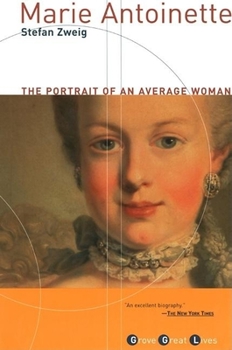Marie Antoinette: The Portrait of an Average Woman
Select Format
Select Condition 
Book Overview
Life at the court of Louis XVI and Marie Antoinette has long captivated readers, drawn by accounts of the intrigues and pageantry that came to such a sudden and unexpected end. Stefan Zweig's Marie Antoinette: The Portrait of an Average Woman is a dramatic account of the guillotine's most famous victim, from the time when as a fourteen-year-old she took Versailles by storm, to her frustrations with her aloof husband, her passionate love affair...
Format:Paperback
Language:English
ISBN:0802139094
ISBN13:9780802139092
Release Date:July 2002
Publisher:Grove Press
Length:496 Pages
Weight:1.46 lbs.
Dimensions:1.3" x 6.0" x 9.0"
Customer Reviews
3 ratings
Stands the test of time very well.
Published by Thriftbooks.com User , 19 years ago
Dating from 1933 in its first edition, this book is part biography and part psychological analysis of the great Austrian Empress Maria Theresa's daughter who died a hated Queen of France. While both its writing style and its ideas - particularly its author's assumptions about the fundamental nature of womanhood - may seem quaint to the 21st Century reader, it's still very well worth reading. Zweig refuses to rely upon a number of commonly used sources that he has reason to consider suspect, and he approaches his subject with genuine interest that's refreshingly uncontaminated by awe. The Archduchess Antoinette, the Dauphiness of France, the giddy young Queen to Louis XVI, the maturing mother of the Dauphin who would have become Louis XVII - Zweig captures them all, and then takes us with him through this woman's terrible final transformation into the prematurely white-haired "Widow Capet" who mounts the scaffold. He writes her life with frankness that's remarkable, truly, considering the era in which his work was originally published.
The story of a Woman
Published by Thriftbooks.com User , 23 years ago
Marie Antoinette... many things go through one's mind when thinking of that name. Many say she was cruel, pampered, and spoiled, and that she was the main couse of the French Revolution, yet, she was just a woman, a woman born a princess in the Austrian court, married to a French boy whom she had never met by the age of 15, crowned by 19, and beheaded by 35. Life went by so fast by Marie Antoinette!!, and never gave her a chance to choose what she wanted out of it. Stefan Zweig is a marvelous writer, and manages to gives us an intimate portrait of at times very hated, at others very loved and admired woman, an ordinary person who only wished for a normal life with her family, a little place of her own, where she didn't have to adjust and adapt to the many different rules impossed on her. He describes the life of the French court as only he could, and you feel like you are part of the story, hearing about Versailles, Louvre, the revolution and the people involved, which makes this an excellent book to learn about history, about life in the French court, and about France's last great queen.So, was she cruel, spoiled, and ignorant? read and decide for yourself....
surreal and magnificent
Published by Thriftbooks.com User , 23 years ago
This book is the perfect introduction to the French revolution. It presents a 'visual guided tour' of the life and death of the tragic queen Marie Antoinette. Written in 1932 by the Viennese Jewish novelist and professional biographer Stephan Zweig, the book dips fairly deeply into psychoanalytical thinking. Sometimes the credibility ascribed to Freudian speculation can seem strained by today's standards. However, the scholarship is truly masterful, and draws on extensive research into the letters and diaries of the most minor characters, without sacrificing narrative style or readability. Zweig writes books that move swiftly, but are rich in detail, and could repay a second reading. Married at fifteen, crowned queen at nineteen, and beheaded at thirty-seven, Marie Antoinette went from the heights of heedless frivolity into the depths of isolation and despair. Zweig argues that she converted the arrogance and narcissism of her early years as the "queen of rococo", into a brave and selfless defense of the aristocratic lost cause. Surrounded by the mounting violence and insanity of the revolution, which mirrored the earlier unreason of a decadent aristocracy, she was stripped of her power and prestige, but passionately refused to surrender her honor. In the end the force of her character vindicated the nobility which her years of frivolity had discredited. But it was too late, the damage had been done, and she more than any other was the symbol against which the revolution was fought. Independent of the historical significance of the topic, this book is magnificently written, it moves at a rapid and exciting pace, and it contains many deep moral lessons. The Freudian prejudices of the author should be borne in mind, but in some ways they add to the phenomenal drama this book evokes.





